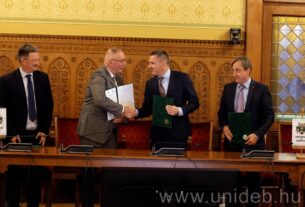Erzsébet Gortka-Rákó, college teacher, head of the Department of Social Pedagogy was assigned to lead the faculty for three years by rector Zoltán Szilvássy.
– The bachelor programmes of the faculty will be renewed by revising the curriculum and by the involvement of relevant actors in the sector. Besides the pedagogy course, we also plan to improve special needs education. The educational programmes will be reformed based on feedback from employers. There is a lot to improve in the field of childcare and special needs education. We are willing to launch a few much-needed programmes – explained Erzsébet Gortka-Rákó, the newly appointed head of the faculty in Hajdúböszörmény.
In years to come, the improvement of international relations will be in the focus of the faculty, based on the efforts of the previous years.
– In line with the current trend, the next step is to start educating kindergarten teachers in English. We also seek to strengthen our presence on the international stage by improving our programmes over the border via cooperating with the Partium Christian University in Oradea, the Rákóczi Ferenc II Transcarpathian Hungarian College of Higher Education, and with the Pope John Paul II University in Kraków – said the dean.
The dean envisions a model that helps disadvantaged young people, as many of the students at the faculty came from this segment of the society.
– We pay special attention to helping these people, and preventing their dropping-out before obtaining a degree. In this respect, the role of the Balázs Lippai Roma College for Advanced Studies is undisputed – pointed out Erzsébet Gortka-Rákó.
In addition to the education of teachers, departments of social sciences have also joined international research work.
– Professionals working in the field of pedagogy have been facing special challenges recently. – What happens is beyond what they were trained for. We have started to process the experience gained during the pandemic situation. The findings will be used in research projects – said the dean.
In addition to improving the significance of the faculty in the region, increasing the number of students is an important objective as well.
– The range of programmes is excellent in the field of advanced professional training. We have launched more than 30 courses this year. And we are about to launch programmes in the fields of infant care and intervention in early childhood. Short programmes are also advantageous for employers. The integration of blended learning into the curriculum would be a great help to those who work and study – she added.
-The shortage in labour force and the demand for training drive us to develop and offer a diverse portfolio of programmes. This is how we can provide our students with a marketable degree and increase the number of our students – explained Erzsébet Gortka-Rákó.
She will be supported by vice deans Sándor Szerepi and Gábor Biczó, and Sándor Pálfi dean referent.
Press Office
unideb.hu


















